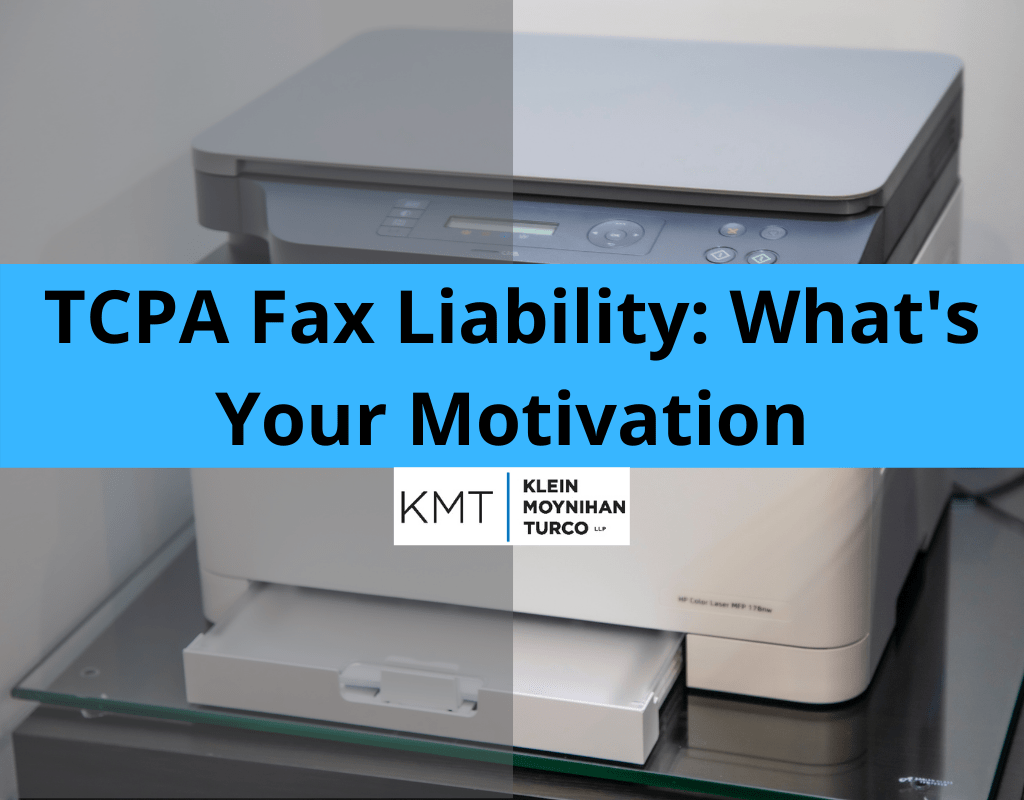Recently, a federal court in Illinois dismissed Telephone Consumer Protection Act (“TCPA”) claims against an animal health and wellness company, Elanco Animal Health, Inc. (“Elanco”). Elanco sent unsolicited facsimile transmissions to Ambassador Animal Hospital, Ltd. (“AAH”) concerning continuing education seminars sponsored by Elanco. The Court dismissed the TCPA fax claims, ruling that plaintiff failed to prove that Elanco had sent the subject unsolicited fax materials with sufficient commercial motivation. As readers know, we regularly cover the latest TCPA developments and provide primers on TCPA basics. The Illinois case at issue in this blog is captioned Ambassador Animal Hospital, Ltd. v. Elanco Animal Health, Inc., Case No. 20-cv-02886 (N.D. of Ill. Feb. 18, 2021).
How does TCPA fax liability attach?
TCPA fax liability requires proof of commercial motivation
A company can be found liable under the TCPA for sending unsolicited faxes that advertise commercial products or services. For example, if restaurant ABC sends unsolicited faxes to all the businesses in its neighborhood advertising 20% off its catering services, ABC may be found liable under the TCPA for each fax sent without recipient consent. Generally, a single unsolicited fax may result in a TCPA claim against the sender. As the Ambassador case explains, unsolicited faxes that do not explicitly advertise a product or service may still violate the TCPA. What matters, the Ambassador Court instructs, is whether the company sending the fax has a commercial motivation.
Even a “free” lunch can serve as mere pre-text for the company that provides the lunch to advertise its goods or services. As the Ambassador Court held, however, faxes may include a company’s logo and some contact information without being deemed commercial in nature. The Court recognized that the faxes at issue included only Elanco’s logo and a phone number to be used to RSVP for Elanco-sponsored seminars. The Ambassador decision leaves open the question of whether including full contact information and nothing else is sufficient proof of a commercial motivation for sending a fax transmission.The Court did specifically mention that no one from AAH attended any of the seminars and, as a result, AAH could not say with any certainty that the seminars were simply a vehicle for Elanco to advertise its products.
What does the Ambassador decision tell us about how to avoid TCPA fax liability?
The Ambassador decision reinforces that the purpose of the TCPA’s ban on unsolicited faxes is to prevent the receipt of unwanted commercial advertisements. One area of interest that the FCC recently clarified is that faxes sent through a “fax-to-email” online service (“E-faxes”) are exempt from the TCPA fax ban. The basis of TCPA fax liability rests, in part, on the fact that the fax machine cannot do anything else besides send and receive one fax transmission at a time. When printing an unsolicited fax advertisement, the machine is rendered otherwise useless and wastes ink and paper. By contrast, however, a phone or computer’s functionality is not affected in the same way by the receipt of an email. This distinction raises an important question: if an E-fax is not a fax for TCPA purposes, is it an email for purposes of another consumer protection statute, namely the CAN-SPAM Act? One Florida federal court suggests that raising a claim under the CAN-SPAM Act might be the proper way to remedy harms from receiving unwanted commercial E-faxes.
Regardless of how courts might address the E-Fax question, the Ambassador decision provides useful analysis as to what plaintiffs must show in order to prove that a fax was sent with an underlying commercial motivation. That motivation can be gleaned from reviewing the content of the subject fax and/or from an experience at a free seminar or lunch that the fax promotes. As such, companies sending unsolicited faxes should be mindful not just of what the fax itself says, but also what the motivation is for sending it.
Avoid Litigation with a Team of TCPA Attorneys
The landscape of TCPA litigation changes almost daily. As the Ambassador decision demonstrates, companies face a complex and intricate web of ongoing TCPA compliance issues. With so many variables, companies must rely on sound telemarketing practices and procedures to maintain compliance with the TCPA and other state and federal laws. The experienced defense attorneys at Klein Moynihan Turco can provide the kind of advice that should help keep your business out of costly and time-consuming TCPA litigation trouble. If you need assistance with evaluating or updating your telemarketing practices and procedures, please email us at info@kleinmoynihan.com or call us at (212) 246-0900.
The material contained herein is provided for informational purposes only and is not legal advice, nor is it a substitute for obtaining legal advice from an attorney. Each situation is unique, and you should not act or rely on any information contained herein without seeking the advice of an experienced attorney.
Attorney Advertising
Photo by Mahrous Houses on Unsplash
Related Posts
Protect Yourself from TCPA Litigation




